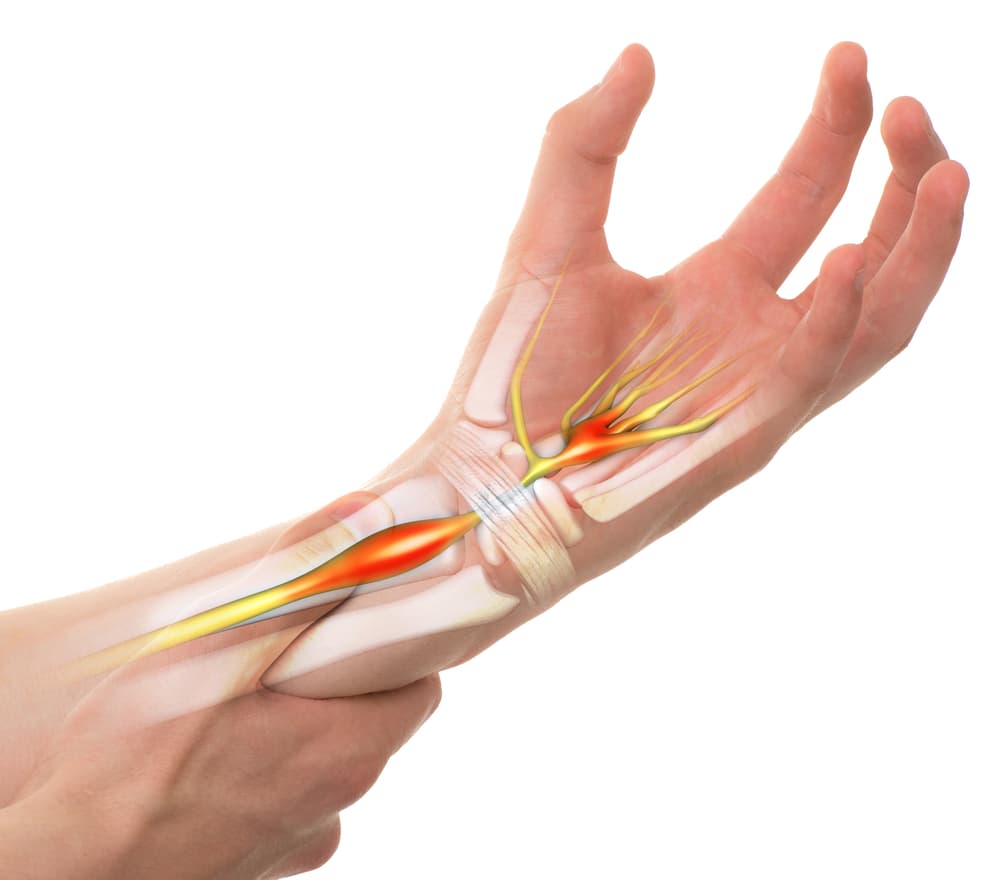Carpal Tunnel

Carpal Tunnel Syndrome (CTS) is a common condition that can significantly impact workers in various industries. However, getting proper workers’ compensation benefits can be challenging for conditions like CTS. Always discuss your claim options with a trusted Indianapolis workers’ comp attorney.
What is Carpal Tunnel Syndrome?
Carpal Tunnel Syndrome is a condition that arises from pressure on the median nerve in the wrist. This nerve, important for sensation and movement in the hand, runs through a narrow passageway in the wrist called the carpal tunnel alongside tendons that bend the fingers. When this tunnel becomes narrowed or the tissues surrounding the flexor tendons swell, it can compress the nerve, leading to the symptoms associated with CTS.
The hallmark symptoms of Carpal Tunnel Syndrome include numbness, tingling, and weakness in the hand and arm. The numbness typically affects the thumb, index, middle, and part of the ring fingers. It’s not uncommon for individuals with CTS to experience a sensation often described as “pins and needles” or as if their hand has fallen asleep. This sensation can sometimes extend up the arm and can be particularly noticeable at night or upon waking in the morning.
In addition to numbness and tingling, many people with CTS experience weakness in their hands. This might manifest as difficulty gripping objects, clumsiness, or a tendency to drop things. In some cases, people may also notice a decrease in the strength of their pinch between the thumb and fingers.
The development of Carpal Tunnel Syndrome can be gradual, with symptoms starting mildly and progressively worsening over time. In its early stages, shaking out the hand may relieve symptoms, but as the condition advances, symptoms may persist and worsen.
CTS is more common in adults, especially women, possibly due to the carpal tunnel being relatively smaller in women than in men. Certain conditions can increase the risk of developing Carpal Tunnel Syndrome, such as diabetes, thyroid dysfunction, fluid retention from pregnancy or menopause, high blood pressure, and autoimmune disorders like rheumatoid arthritis.
Regarding occupational risk, CTS is often associated with repetitive manual tasks, especially those involving vibrating tools or activities that require prolonged flexing of the wrist. This association with certain types of work has made CTS a focus of discussions about workplace ergonomics and worker health.
The diagnosis of Carpal Tunnel Syndrome is primarily based on symptoms and physical examination. In some cases, physicians may use tests, such as nerve conduction studies or electromyography, to confirm the diagnosis or assess the severity of the condition.
Treatment for Carpal Tunnel Syndrome varies depending on the severity of the symptoms and the underlying cause. Initial treatments often include:
- Resting the affected hand and wrist.
- Avoiding activities that can worsen symptoms.
- Wearing a splint to keep the wrist straight, especially at night.
Other treatments may include medications to relieve pain and inflammation, exercises, and changes in workplace ergonomics. In more severe cases, or if conservative treatments fail to provide relief, surgery may be an option to relieve the pressure on the median nerve.
Always receive the treatment you need and allow a workers’ compensation lawyer to handle the claim process.
How is Carpal Tunnel Syndrome Related to Work?

CTS often stems from work, particularly in roles that involve repetitive motions or strain on the hands and wrists. Understanding this connection is key, especially for those experiencing symptoms and considering a workers’ compensation claim.
At its core, CTS is a medical condition where the median nerve, which runs from the forearm into the hand, becomes compressed at the wrist. This nerve is crucial for sensation and movement in the hand, making its impairment a significant concern. The role of work in the development of CTS can vary, but several common job-related factors contribute to its onset.
Repetitive hand movements are a major factor. Jobs that require constant typing, like administrative work or writing, can strain the wrist over time. The continuous motion, especially if done with improper posture or without adequate breaks, can lead to swelling and pressure in the carpal tunnel, the narrow passageway in the wrist where the median nerve resides.
Awkward hand positions also contribute to the development of CTS. Work that demands holding the hand and wrist at an unnatural angle for prolonged periods, like certain kinds of assembly line work or even hairstyling, can increase the risk. Over time, these positions can irritate the tissues around the median nerve, leading to the classic symptoms of numbness, tingling, and pain in the affected hand.
Strong gripping is another common cause, particularly in jobs that involve using tools that require a firm grip, like construction or mechanical work. This continuous pressure can exacerbate the swelling in the carpal tunnel, compressing the median nerve.
Mechanical stress on the palm, often experienced in occupations requiring the use of vibrating tools, is another risk factor. The vibration can cause repeated jarring and stress to the wrist, leading to inflammation and nerve compression.
While these work-related factors can contribute to the development of CTS, this condition can also arise from activities outside of work or other health conditions, like arthritis or diabetes. Therefore, attributing Carpal Tunnel Syndrome solely to workplace factors can be challenging and requires legal assistance. Always consult a workers’ compensation attorney near you.
Workers’ Compensation and Carpal Tunnel Syndrome
You may be eligible for workers’ compensation if you’re experiencing Carpal Tunnel Syndrome due to your job. Here’s what you need to know:
Understanding Workers’ Compensation
Workers’ compensation is insurance providing income replacement and medical benefits to employees injured during employment. It should ensure that workers receive proper care and support without legal action.
Report the Injury
The first step in addressing CTS as a work-related issue is to report the injury to your employer. There are often strict time limits for reporting work-related injuries, and failing to report in a timely manner can negatively impact your ability to file a successful workers’ compensation claim. When reporting, it’s important to be clear and detailed about your symptoms and why you believe they relate to your work. This initial report can be verbal, but it’s typically advisable to follow up with a written notice for documentation purposes. Your employer should then inform you about the next steps in the workers’ compensation process, which often includes directing you to specific healthcare providers or giving you forms to complete.
Seek Medical Attention

Once you have reported the injury, the next step is to consult a healthcare professional for a proper diagnosis and treatment plan. This step is crucial because medical records form the foundation of your workers’ compensation claim. A healthcare professional will evaluate your symptoms, perform necessary tests, and determine whether your condition is Carpal Tunnel Syndrome. They can also assess whether it’s likely work-related based on your job duties and the nature of your symptoms. Their diagnosis, treatment recommendations, and any notes on how your condition may be linked to your job activities will support your claim.
Document Everything
Keeping a detailed record of your journey through Carpal Tunnel Syndrome is advised. Document your symptoms, the dates they began or worsened, and how they affect your ability to work and perform daily activities. Keep a record of all medical appointments, treatments received, and any recommendations or restrictions your healthcare provider suggests. Also, note any discussions with your employer about your condition and their response. This comprehensive documentation will be valuable if there are any questions or disputes about the nature of your injury and its connection to your job.
Your workers’ comp lawyer can present your documentation to prove your claim.
File a Workers’ Compensation Claim

The final step is to officially file a workers’ compensation claim. This process typically involves filling out specific forms provided by your employer or your state’s workers’ compensation board. These forms will ask for detailed information about your injury, your employment, and the impact the condition has had on your ability to work. The process for filing a claim can vary significantly from state to state, so it’s important to understand the requirements in your area.
You may need to submit the forms to your employer, the workers’ compensation board, or both. Ensure all information is accurate and complete, and keep copies of everything you submit. Better yet, allow your workers’ compensation attorney to handle all of this.
What Does Workers’ Compensation Cover?
Workers’ compensation can cover medical expenses related to treating Carpal Tunnel Syndrome, such as doctor’s visits, physical therapy, and even surgery if needed. It may also provide disability benefits if you cannot work due to your condition.
What Happens If Your Workers’ Compensation Claim for Carpal Tunnel Syndrome Is Denied
Receiving a denial of your workers’ compensation claim can be disheartening, especially if you are struggling with the symptoms of Carpal Tunnel Syndrome. However, a denial is not the end of the road, and there are steps you can take to challenge the decision. You should immediately discuss the denial with a workers’ comp lawyer.
When a workers’ compensation claim is denied, the denial letter should clearly state the reasons for the decision. Common reasons for denial may include a lack of evidence that the injury is work-related, missing the deadline for reporting the injury or filing the claim, or discrepancies in the medical records.
Upon receiving a denial, pay close attention to the details in the letter. This will guide your next steps. Typically, you will have a limited time to appeal the decision, making it important to act promptly.
The appeal process usually involves filing specific paperwork with the workers’ compensation board or a similar authority. This is your opportunity to address the reasons for the denial. For instance, if the claim was denied due to a lack of medical evidence, you might submit additional medical records or a letter from your doctor clarifying how your Carpal Tunnel Syndrome is related to your work.
In some cases, the appeal process may involve a hearing, where you can present your case in front of a workers’ compensation judge. During this hearing, you’ll have the opportunity to provide evidence, call witnesses, and make a case for why your claim should be accepted. It’s often beneficial to have legal representation at this stage, as an attorney who handles workers’ compensation can effectively present your case.
It’s also worth noting that the appeal process can vary from one jurisdiction to another, so it’s helpful to be familiar with the specific procedures and deadlines in your area. Additionally, the process can be time-consuming and may require a significant amount of detailed paperwork and preparation.
If your appeal is successful, your claim will be accepted, and you’ll receive the workers’ compensation benefits you’re entitled to. These benefits can include medical treatment for your Carpal Tunnel Syndrome and compensation for lost income if you cannot work.
Common Industries Affected by Carpal Tunnel Syndrome

CTS is a condition that can affect workers in various industries, particularly those involving repetitive hand movements, prolonged wrist flexion, or the use of vibrating tools. Understanding which industries are commonly affected by CTS is important for both employees and employers regarding awareness, prevention, and appropriate response to symptoms.
- Office and Administrative Work: This sector often requires extensive keyboard and mouse use, which can lead to repetitive strain on the wrist and hand. Employees like data entry clerks, typists, and administrative assistants are particularly at risk.
- Manufacturing and Assembly Line Work: Workers in these industries frequently perform repetitive manual tasks. Assembling small parts, handling tools, or performing the same hand movements for prolonged periods can increase the risk of developing CTS.
- Information Technology and Data Entry: IT professionals and data entry personnel spend considerable time typing and using computer equipment. The repetitive nature of these tasks, combined with poor ergonomic practices, can lead to the development of CTS.
- Healthcare Professionals: Nurses, lab technicians, and others who repeatedly use their hands for fine motor tasks are at risk. Surgeons and dentists, who often work in static, awkward positions, may also experience strain leading to CTS.
- Construction and Carpentry: These jobs involve vibrating tools and heavy manual labor, both of which can contribute to the onset of Carpal Tunnel Syndrome. The gripping and wrist flexion required in these tasks can create significant strain on the median nerve.
- Retail and Food Service: Workers in these sectors often perform repetitive tasks like scanning items at a checkout, cooking and preparing food, or stocking shelves. Such activities, especially when performed rapidly or under pressure, can put stress on the hands and wrists.
- Textile, Sewing, and Tailoring: The fine, repetitive movements in sewing and fabric work can lead to CTS. This is especially true in industrial settings where workers may operate sewing machines for extended periods.
- Musicians: Certain musical instruments require repetitive finger and wrist movements, sometimes in awkward positions. This can place musicians, particularly those who play string instruments or keyboards, at a higher risk of developing CTS.
- Drivers and Equipment Operators: Long hours of gripping a steering wheel or operating machinery can contribute to CTS, especially if the equipment vibrates or requires a tight grip.
Each of these industries has unique risk factors for Carpal Tunnel Syndrome, but the common thread is the repetitive strain on the hands and wrists.
Contact a Workers’ Compensation Lawyer About Your CTS Claim

If you’re struggling with Carpal Tunnel Syndrome as a result of your job, seek legal advice from a workers’ comp attorney. Workers’ compensation is there to support you, and we’re here to help guide you through the process. Understanding your rights and the steps to take can make a significant difference in managing this condition and ensuring your well-being at work. Remember, your health and safety should always be a priority.

